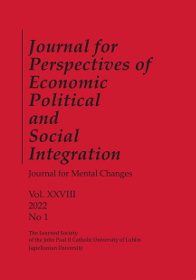Career Path Choices of Vocational School Students in the Context of Their Entrepreneurial Abilities, General Aptitude, and Hope for Success
Abstract
The right choice of career path for young people deciding to attend vocational school can prove to be an important factor not only for future educational success, but also for a successful transition from education to work. It is, on the one hand, a key developmental challenge for young people entering adulthood and, on the other, an expectation and concern for local authorities shaping education policy in the context of the needs of the local economy. The problem of a successful transition from education to work is, then, an interdisciplinary issue, related to both psychology (individual differences) and the management of local development oriented towards providing the local economy with the necessary competences for work. Therefore, it is also and actually first and foremost, an important challenge for career counselling and for young people. The article presents an empirical study of 3,577 vocational and technical school students, covering 1,080 female and 2,497 male students, conducted in 19 schools in Poznań in 27 fields of study using questionnaires and psychological tests to determine entrepreneurial abilities (KUP), hope for success (KNS) and general aptitude (APIS). Our analyses of the research results led us to claim that there is a relationship between entrepreneurial abilities, general aptitude and hope for success and the career path choices of vocational school students. It was shown, with the use of artificial intelligence, that on the basis of the results of questionnaires measuring these student characteristics, a prediction can be made about the choice of further career or educational direction. The results of the analysis using AI can support career counselling for vocational students and the development of a career counselling system at this and earlier stages of education.
References
Bańka, A. (2007). Psychologiczne doradztwo karier. SPiA.
Breiman, L., Friedman, J. H., Olshen, R. A., & Stone, C. J. (1984). Classification and regression trees. Wadsworth & Brooks/Cole Advanced Books & Software.
Ciechanowicz, A., Jaworowska, A., Matczak A., & Szustrowa, T. (1995). APIS – P(R). Podręcznik. PTP.
Cromie, S. (2000). Assessing entrepreneurial inclinations: Some approaches and empirical evidence. European Journal of Work and Organizational Psychology, 9(1), 7–30.
Drucker, P. F. (1992). Innowacja i przedsiębiorczość. Praktyka i zasady. PWE.
Drucker, P. F. (2004). Natchnienie i fart, czyli innowacja i przedsiębiorczość. Studio Emka.
Jensen, A. R. (1987). Intelligence is a fact of nature. Zeitschrift für Pädagogische Psychologie, 1, 157–169.
Łaguna, M., Trzebiński, J., & Zięba M. (2005). KNS – Kwestionariusz Nadziei na Sukces. Podręcznik. PTP.
McClellend, D. (1965). N achievement and entrepreneurship: A longitudinal study. Journal of Personality and Social Psychology, 1(4) 389–392.
Nosal, Cz. (1990). Psychologiczne modele umysłu. PWN.
Noworol, Cz. (2006). Tranzycja karier młodzieży do przedsiębiorczości. In B. Rożnowski, A. Biela, & A. Bańka (Eds.), Praca i organizacja w procesie zmian. SPiA.
Noworol, A. (2013). Kompendium Kodów MZZ dla Typów Obszarów Pracy, Zawodów i specjalności. Narodowe Forum Doradztwa Kariery.
Noworol, Cz. (2013). Heurystyki kategorii rozmytych w koncepcji pomiaru psychologicznego. Wydawnictwo Uniwersytetu Jagiellońskiego.
Noworol, Cz. (2016). Kwestionariusz Uzdolnień Przedsiębiorczych KUP. Podręcznik dla doradców zawodowych. NFDK.
Richter, P. G., Kemter, P. (2000). Factors of success in small business. In M. Vartiainen & F. Avalone (Eds.), Innovative theories, tools and practices in work and organizational psychology. Hgrefe & Huber.
Rotter, J. B. (1966). Generalized expectancies for internal versus external control of reinforcement. Psychological Monographs. General and Applied, 80(1), 1–28. https://doi.org/10.1037/h0092976
Seligman, M. E. (1993). Optymizmu można się nauczyć. Media Rodzina.
Skarzyński, M. (2007). Kierunki rozwoju i nowe priorytety poradnictwa na rynku pracy. In Polska Wschodnia – czynniki rozwoju. Wyższa Szkoła Administracji Publicznej w Białymstoku.
Snyder, C. R. (2002). Hope Theory: Rainbows in the mind. Psychological Inquiry, 13(4), 249–275.
Snyder, C. R., Cheavens, J., & Sympson, S. C. (2000). Hope: An individual motive for social commerce. Group Dynamics: Theory, Research and Practice, 1(2), 107–118.
Snyder, C. R., Sympson, S. C., Michael, S. T., & Cheavens, J. (2000). Optimism and hope constructs: variations on a positive expectancy theme. In E. E. Chang (Ed.), Optimism and pessimism: Implications for theory, research and practice (pp. 101–123). American Psychological Association.
Copyright (c) 2022 Journal for Perspectives of Economic Political and Social Integration

This work is licensed under a Creative Commons Attribution-NonCommercial-NoDerivatives 4.0 International License.

